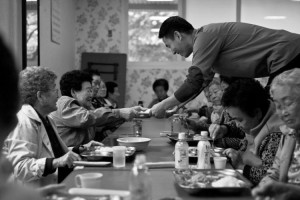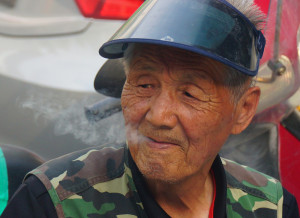
I was asked the other day by a reader of one of my blogs if there is any country other than Korea that had such an accelerated path from colony to third world to first world in such a short period of time. The answer must certainly be no and this could have created a curious and sometimes infuriating trait endowed to much of the population in Korea of a marked disparity between the young and old in thinking and behaviour.
In my own country, I am used to my elders being quite wise and with a fair amount of knowledge on a wide range of things. My social groups revolved around the sports of squash and cricket, and within these sets of friends I was lucky to count among them those that were in excess of 40, 50, and 60 years old. I found these people easy to respect even if I disagreed with them on something, indeed they were to be respected because they could accept a confrontation or two on their views. Those living in Korea should know all too well that this kind of situation doesn’t really occur here. At my orientation for my latest public school position, I told a newbie to Korea that it is extremely rare that Koreans make friends that are even a few years older than them, which he was quite astonished about. To prove the point, I asked a Korean university student who was helping us at the time whether he could be friends with a 40 year-old; his answer was, Impossible! I have always thought this a shame as I learnt so much from older friends when I was younger.
The question is, however, even if making friends with older people was possible and respect culture was not an issue, would it happen? And also, would the same effect of imparted knowledge and wisdom from the old to the young occur? I say this because I often have the awful feeling that, the older the person is that I am speaking to in Korea, the less wise, intelligent, and polite they become. It is only the times that I am speaking to a person much older than me that I truly feel Korea is an alien land. In England it is our youth that are usually impolite, rash, and imprudent but it is like arriving in Topsy-turvy land in Korea where they get this all the wrong way round. This phenomenon is largely explained by Korea’s turbulent past and speed of development.
Young people usually impress me in Korea. Considering the problems with the Native English teacher system in Korea, I think they are remarkably kind and respectful to foreign teachers (I know some will disagree with this point). They are open-minded and, generally, I have the feeling of being roughly on the same page when I converse with them. There is at least some level of a mutual understanding with each other; it is simply the language barrier that makes things difficult. The same is also true of most Korean women I meet. It is difficult to find a definitive cut-off point exactly, but I am going to say Korean women of under about 40 years old. They are like kindred spirits in all the awkward situations I find myself in at work. At staff dinners they often seem about as uncomfortable as me and equally dreading round 2, 3, or 4 after the initial dinner. The older men at these gatherings confound me entirely. I rather enjoy just sitting back and examining the scene of the average staff dinner because it tells an interesting story and the tale is one of old children (or at least irresponsible youngsters) in charge of adults. Perhaps I should explain.
 I have always thought that a trait of older people should be looking after the young. Now, this is what they are supposed to do in Korea, but sorry, I just don’t see it. They set a bad example and are poor role models to the young with a range of bad habits including their famously noisy spitting, impatience in driving and waiting in line, bad language, and smoking. The teachers in my school smoke in the toilets right near the entrance to the school. The first thing you can smell is smoke as you enter, something I cannot believe the school or the parents of the students put up with. They, of course, come down on the students harshly if they do the same. At staff dinners it is the old, both men and women encouraging (sometimes forcing) the rest to drink excessively. At a recent staff dinner one older male teacher proudly told me that once he was drunk for 20 days in a month, but these days he just sticks to twice a week. This is the kind of thing I would expect a young chav to say back in England and not a 50 year-old man. He also added that his wife hates drinking and especially when he gets drunk. One wonders how they are still together, as he drank enough in 2 hours to knock out an elephant.
I have always thought that a trait of older people should be looking after the young. Now, this is what they are supposed to do in Korea, but sorry, I just don’t see it. They set a bad example and are poor role models to the young with a range of bad habits including their famously noisy spitting, impatience in driving and waiting in line, bad language, and smoking. The teachers in my school smoke in the toilets right near the entrance to the school. The first thing you can smell is smoke as you enter, something I cannot believe the school or the parents of the students put up with. They, of course, come down on the students harshly if they do the same. At staff dinners it is the old, both men and women encouraging (sometimes forcing) the rest to drink excessively. At a recent staff dinner one older male teacher proudly told me that once he was drunk for 20 days in a month, but these days he just sticks to twice a week. This is the kind of thing I would expect a young chav to say back in England and not a 50 year-old man. He also added that his wife hates drinking and especially when he gets drunk. One wonders how they are still together, as he drank enough in 2 hours to knock out an elephant.
It is not only the general manners and attitudes, but also wisdom and knowledge appear, somewhat paradoxically, to be greater in the young, with the exception of more recent historical and traditional matters. This seems to be one of the only useful things they do, pass on knowledge of history and traditions to the young, keeping the culture alive. Even this, though, can be a problem as they keep alive dated traditions that need changing, stultifying progress in many respects. They also encourage the continuation of resentment and hatred of past ills towards their country, especially by the Japanese. Whilst this maybe all true (the Japanese also propagandise their young people in the same fashion) instead of just passing down the knowledge and facts of what happened in the past, they also pass down the hatred, which is a bit of a problem in resolving any issues the two countries might have in the future. I was always shocked that sometimes children as young as 9 or 10 years old were not only so well informed about issues regarding the Japanese, but were so passionately anti-Japanese as well. For me they are too young to be so concerned about such matters. No doubt the Japanese do the same to their young people and so it goes on with the hatred and bitterness as strong as it ever was.
It is no surprise that the trend is that younger people are better educated. Since the end of the Korean War education has improved markedly and literacy rates have soared. Illiteracy is really only present in the oldest part of the populace in Korea and as they die off the figure continues towards the 100% mark year on year. Although the conclusion I come to – because of my experiences and much of the statistics I see about education in Korea – is that the young have just as much, if not more to offer in most departments, this is not how the culture really works. The voice of the young is not kept completely silent, but it is certainly heavily muffled by those of higher status, and unfortunately they are usually just the sort of older people I am talking about. It is they that call the shots. This plays a role in relationships all over the country, at work and in the family, but it is also important in politics. Some even attributed Park Geun Hye’s victory in the recent election to the countries demographics, and with good reason. Statistics released after the election result showed that 62% of 50-60 year olds and 72% of 60-70 year olds voted for Park Geun Hye, while 66% of voters in their 20s and 30s voted for Moon Jae In. Crucially, Korea has an aging population and this helped the conservative Ms Park significantly. This suggests very strongly that the youth of Korea tend to be much more liberal minded and the old more conservative, not really a surprise and exactly what I experience daily. The problem is, though, that even the more liberal political parties in Korea are still quite conservative by Western standards.

Korea must be set for some big changes in the future once this generation gap is closed, which in 20 or 30 years should have all but disappeared due to everyone who is still alive having grown up with similar opportunities for education, information, and life experience. I am optimistic, but recognise that I and many Koreans will have to endure much of the older population for some time yet. This sounds overly harsh, but enlightened conversations and experiences with anyone over about 50 years old in Korea are conspicuous by their absence in my 3 and a half years living here so far, and the situation is quite the opposite with the younger people I have met both in schools and outside of them. There are obviously many exceptions, but this is the overwhelming pattern I am experiencing, but maybe I am meeting the wrong people. One must recognise, however, that it is the older generation that lived through some of the hardest times during and after the war and pulled the nation up from extreme poverty to a major economic power on the world scene. This is an achievement that cannot be denied and should be a sense of great pride, but times have changed so fast that the older generation have been very much left behind, despite the fact that it is they who are very much in charge and were the authors of the transition in the first place.
Korea’s thirst for economic progress and notoriety on the world stage matches its respect for traditions and the old and this is another factor in a possibly big change coming. There are still issues in Korean business with young new talent being obstructed from leadership roles because of their age. As big companies are becoming aware of, however, the younger generation often trump the older generation in talent and business acumen and changes are afoot because, after all, business is about making money and growing the economy, not placating your elders. As the younger generation age, Korea will become a better place, I am sure of it, and if this doesn’t drive change, surely the ability to be more efficient, productive, and successful on the world stage will.
Sources:
http://www.unesco.org/education/wef/countryreports/korea/rappport_2_1.html
http://blogs.wsj.com/korearealtime/2012/12/20/how-did-park-win-a-breakdown/
